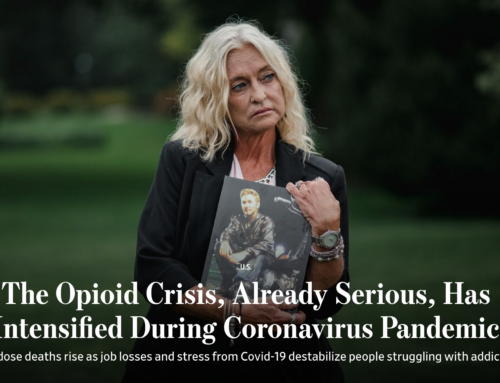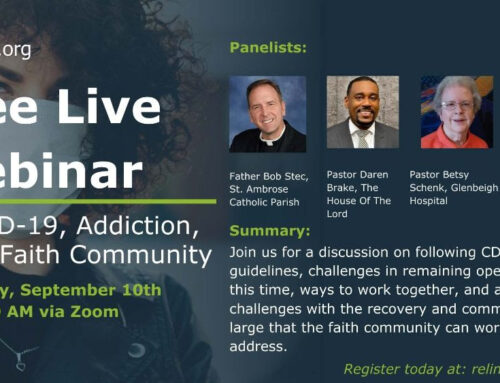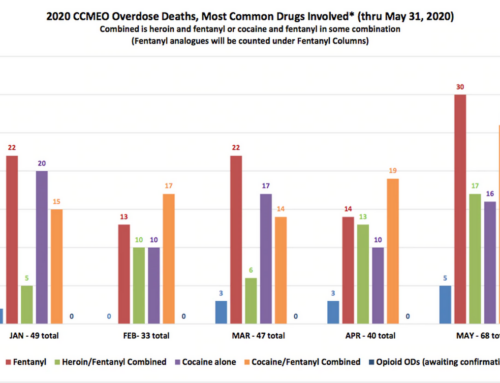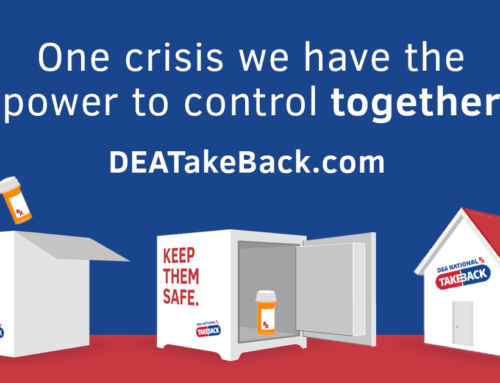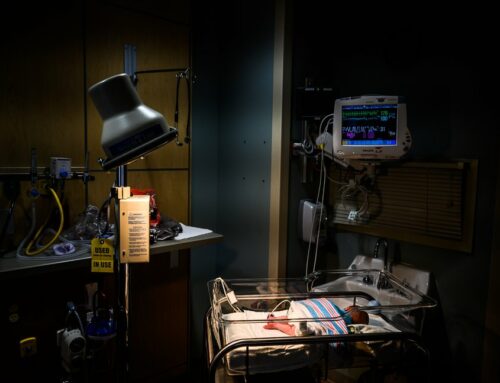Left behind by addict parents, tens of thousands of youngsters flood the nation’s foster-care system; grandparents become moms and dads again
The police officer who entered Mikaya Feucht’s Ohio apartment found it littered with trash, dirty dishes and plastic milk jugs full of the opioid addict’s vomit.
He also found two toddlers, aged 3 and 2, who watched as the officer uncovered the track marks on their mother’s arms and looked in vain for any food to feed them.
That was three years ago. By the time Mikaya overdosed and died from the elephant tranquilizer carfentanil this summer, her sons were living with their grandparents. But the chaos of watching their mother descend into addiction will burden them for years. They were often hungry and dirty in her care, and spoke of being hit with a belt by her boyfriend, according to their grandparents.
At the funeral home before Mikaya, 24 years old, was cremated, her younger son, Reed, clung to her through the open casket. “And it wasn’t just a quick hug. It was heartbreaking,” says Chuck Curran, his grandfather.
Widespread abuse of powerful opioids has pushed U.S. overdose death rates to all-time highs. It has also traumatized tens of thousands of children. The number of youngsters in foster care in many states has soared, overwhelming social workers and courts. Hospitals that once saw few opioid-addicted newborns are now treating dozens a year.
And many of the children who remain in the care of addicted parents are growing up in mayhem. They watch their mothers and fathers overdose and die on the bathroom floor. They live without electricity, food or heat when their parents can’t pay the bills. They stop going to school, and learn to steal and forage to meet their basic needs.
“They are out there in the thousands. And they are our kids,” said H. Jane Sites, director of a mental-health treatment program for traumatized children at Cincinnati Children’s Hospital Medical Center. She was speaking to a packed conference convened last month to address the impact of heroin addiction on children.
Social workers say the scale of the trouble exceeds anything they saw during the crack-cocaine or methamphetamine crises of previous decades. Heroin and other opioids are so addictive they can overwhelm even the strongest parental instinct to care for a child, doctors and social workers say.
The recent black-market arrival of synthetic opioids many times more potent than heroin, such as fentanyl and carfentanil, has only made the crisis worse.
Images of parents overdosing in front of their children have gone viral. Authorities in one Ohio town posted a photo of a child in the back seat of an SUV with two adults unconscious in the front, saying they wanted to raise awareness about the desperate circumstances many children face.

In Ohio, opioids are the main cause of a 19% increase in the number of kids removed from parental custody and placed with relatives or foster homes since 2010, according to an association of Ohio’s county-level children’s services agencies. In Vermont, that number grew by 40% between 2013 and 2016, largely due to opioids, according to the state’s Department for Children and Families.
In West Virginia, another state hit hard by opioid addiction, the number of children in foster care grew by 24% between 2012 and 2016, according to the state’s Department of Health & Human Resources.
A Facebook support group for grandparents raising grandchildren due to addiction now has 2,000 members nationwide. One is Michelle Curran, who took custody of her grandsons three years ago, as her daughter, Mikaya, fell apart.
Ms. Curran lives in a ranch house in suburban Columbus, Ohio, that she and her husband built for their retirement. She used to make the two-hour drive to her daughter’s apartment in Fostoria, a small town south of Toledo, to babysit the toddlers. As a young mother Mikaya took good care of her kids, Ms. Curran says, and went to beauty school to train as a hairdresser.



About three years ago Ms. Curran started noticing Mikaya’s home and children growing more unkempt. And Mikaya was constantly asking for money.
During one babysitting trip, Mikaya’s son Lane, then 3 years old, walked into the room with a tin can full of syringes, spoons and a powdered substance Ms. Curran later learned was heroin. “I said, where did you get that? He showed me. It was in a drawer in her bedroom,” she remembers.
Ms. Curran confronted her daughter, and offered to take the boys, saying she could give Mikaya a break for a couple of weeks. Mikaya agreed. Meanwhile, the manager of Mikaya’s apartment building tipped off the police to the squalor. An officer arranged to meet Ms. Curran at the apartment with the boys.
The day she returned, Reed, then 2, “was shaking and crying” as they walked toward the apartment, Ms. Curran remembers. ‘You told us we didn’t have to come back!’ ” he shouted.
Soon after they arrived at Mikaya’s, so did the police. As the children stood by crying, the officer made Mikaya pull up the sleeves of her hoodie to show the track marks on her arms. “How are you going to take care of these boys? Where is your food? What the hell is going on here?’” Ms. Curran recalls him asking. He made Mikaya open her kitchen cabinets, which were empty. Littering the apartment were plastic milk jugs that had been cut open to hold vomit, signs that Mikaya was suffering withdrawal symptoms because she had run out of money to buy drugs, Ms. Curran says.
A court awarded Ms. Curran emergency custody, which turned into a long-term arrangement as Mikaya bounced in and out of rehab and went through periods of homelessness. The boys’ fathers were never a steady presence in their lives, Ms. Curran says.
Living with the Currans, Lane spoke about Mikaya’s boyfriend hitting him. And for a long time both boys clung to their grandparents’ side at all times, even when they went outside to smoke. “They were afraid we were going to leave them,” Mr. Curran says.

Lane and Reed also worried about going hungry. “They would constantly look in our pantry and freak out if there was a bare spot. I had to constantly move food forward to calm them down,” Ms. Curran says. At night they’d ask what they’d be having for breakfast and lunch the next day.
In July, after many attempts at rehab, Mikaya overdosed and died in a Florida hotel room. Authorities found carfentanil and a trace of heroin in her blood.
Dressed in Spider-Man and Teenage Mutant Ninja Turtles pajamas one recent evening in the Currans’ house, Lane and Reed, now 7 and 5, had a bedtime snack and shared photos of their mother, and an urn containing her ashes.
“She went to Florida to get better,” said Lane, holding up a picture of his mother on a beach.


The Currans are adopting Lane and Reed. The boys are doing better these days, though the Currans worry about providing for them. Ms. Curran, 47, is a production support analyst for a company that finances credit cards. Mr. Curran, 63, is nearing retirement as the manager of an automotive plant. “So my potential to save for college is limited,” he says. He worries about not being around to care for the boys in their teenage years.
Similar conversations are occurring across the U.S., in every socio-economic group. Many who were preparing for retirement are suddenly faced not just with the unraveling of a previously functional adult child, but with several young mouths to feed.
Paula and Jim Meisberger, of Lebanon, Ind., adopted three of their grandchildren last year, after heroin addiction overcame the youngsters’ parents.
“For my husband’s 35th anniversary at the company everyone asked if he was going to retire. He said, ‘No, I have a newborn,’ ” Ms. Meisberger says of her husband, a 56-year-old UPS driver. “Don’t get me wrong, I love the kids with all my heart and soul. But this should be our time,” she says. “I would love to be able to spoil them and send them home.”
The Meisbergers took custody of the two older children in 2013, after police found the parents high on heroin in a parked car, along with a third adult who had overdosed. In the back seat was eight-month-old Estele.

When family members went to clear out the home where Estele and her 3-year-old sister, Zoey, had been living with their parents, they found broken glass and garbage on the floor, and cut-open soda cans that had been used to smoke drugs, Ms. Meisberger says. She later learned that her daughter, Brooke, had been selling the children’s toys, clothing and even one of their beds to raise money for drugs.
Zoey had taken to twisting and pulling her hair so much she had patches of baldness when her grandparents took custody. The toddler told a therapist she started doing it when she couldn’t get her younger sister Estele to stop crying. “I’d shake my mommy and shake my daddy and neither one of them would get up,” she told the therapist. “I would just cry and tell them, someone needs to get up.”
In early 2014 Brooke had a third child, Raiden, who was born addicted to opioids. The Meisbergers took custody of the boy straight away. He was sickly in his first year, with underdeveloped lungs that required the Meisbergers to monitor his breathing.
Six-year-old Zoey at times still reverts to twisting her hair, sometimes triggered when Brooke has visited the children, Ms. Meisberger says. While Estele, 4, is friendly with her mother, Zoey is “more standoffish,” her grandmother says. “Zoey remembers the bad,” she says.
Brooke recently had a fourth child who is living with the father’s sister. Brooke says she isn’t currently using drugs. She says she regrets some of her past choices and considers it a “huge blessing” that Zoey, Estele and Raiden are with their grandparents. “At that point in my life I was not able to take care of them,” she says.




While social workers usually prefer that relatives take custody of neglected children, many counties are leaning more on foster parents, too. Ohio’s Lucas County, home of Toledo, put up billboards this year to try to recruit new foster parents, and handed out fliers at parades and the county fair.
The county aims to more than double its stable of foster families to about 650, to cope with a 20% surge this year in the number of children removed from parental custody, many due to opioids, according to Robin Reese, executive director of Lucas County Children Services.
Recently, two biological parents of children in foster care in the county overdosed and died within the space of a week, Ms. Reese says.
“Honestly, if something doesn’t happen with this addiction crisis, we can lose a generation of kids,” Ms. Reese says. “God knows I would hate to see orphanages come back, but the child-protection system is being inundated now.”
In 2009, Stephanie and Doug Horton of Batavia, Ohio, became foster parents to an infant boy, Ben, whose biological parents abused heroin. Ben was born addicted to the drug, and went through months of painful withdrawal marked by tremors and high-pitched crying.


Ben’s biological mother quickly dropped out of his life, but his father, David McIntosh, cleaned up and regained custody when Ben was 20 months old.
When he was healthy Mr. McIntosh was a warm, loving father who had a strong bond with his son, says Ms. Horton, who often helped out as a babysitter. His sobriety didn’t last long.
Soon Ben was watching his father shoot up and sometimes pass out, Ms. Horton says. When Ben was hungry, he would climb on the kitchen counter to look for food, she says.
When she baby-sat Ben, he would describe his father’s drug use in detail. He talked about the blue rubber band his father put on his arm, and the spoon he used to cook the heroin. “He would say, ‘He puts a needle in his arm, and then he gets sick in the bathroom, and I watch movies,’ ” Ms. Horton says.
Sometimes he would talk about not being able to wake his father.
The Hortons regained custody of Ben 18 months later and adopted him last year, raising him alongside their three biological children. This spring, Mr. McIntosh died of an overdose of fentanyl and morphine.
On a recent morning at the Hortons’ home about half an hour east of Cincinnati, Ben, now 7 years old and dressed in a Harry Potter outfit, turned the pages of a 4×6 photo album of his biological father, whom he calls his “other daddy.” Taken during one of Mr. McIntosh’s supervised visits with Ben about a year before his death, the snapshots show them reading a comic book, playing football and mugging for the camera.

“This is my visit with my other daddy. I’m eating a doughnut,” Ben said as he paged through the album.
As Ms. Horton recalled the day Mr. McIntosh overdosed and died at his home in Cincinnati, Ben broke in to ask whether anyone had tried to save him.
“It was too late, remember? His heart stopped,” Ms. Horton answered.
“It was too late,” Ben repeated, looking down. “He was a very nice dad.”
For the past four years, Ben has received counseling at a special program for traumatized children at Cincinnati Children’s Hospital Medical Center. His therapist, Francoise Pierredon, says he’s benefited greatly from the love and security the Hortons have given him. But his history remains a heavy burden.
Now in first grade, he suffers from post-traumatic stress disorder and bouts of mania and aggression that used to drive him to scratch his adoptive brother’s face, according to his therapist and Ms. Horton. He often has trouble sleeping through the night without medication, and becomes so obsessive about his interests—superheroes, Harry Potter, Indiana Jones—that he alienates other children by talking about them nonstop.


The Hortons’ basement is full of toys and swings they bought to soothe their adopted son, including a trampoline where he can work out his aggression. “Otherwise you see him throwing himself against the couch, throwing himself against the floor,” Ms. Horton says.
When he speaks about his father’s drug use, he sometimes mixes it up with imagery from horror films he watched on television while his father got high. “Ben will say, ‘When he got really sick and passed out, a man stuck his hand through our door with a knife.’ And to him that’s a real memory,” Ms. Horton says.
After his therapy appointment one recent morning, Ben talked about how it felt to be adopted. He said he liked “that this is my forever family,” and that “they give me food and stuff like that, and help me.”
Then he showed off a recent gift from his adoptive grandmother—a pair of light-up Captain America sneakers—stamping to make them glow blue. “I never had light-up shoes and I needed them so bad,” he said. “I need them to run in the dark.”
More than 300,000 Americans have died from opioid overdoses since the late 1990s
Write to Jeanne Whalen at [email protected]


